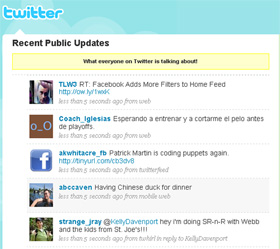 So, like my colleague Marja I just started using Twitter to see what it’s all about. Twitter is basically offering what status updates are in Facebook, (they are therefore even competing for the same users [VentureBeat.com]) with Twitter being more open since it is specialized in one thing only: asking the question “What are you doing?”. When you answer that question, the whole world can (by default) see your answer, and people can start following the comings and goings of their friends or even total strangers that they find interesting by subscribing to their Twitter-streams. This stream of so called “microblogs” – one sentence-blog entries – then really becomes a river of information that you simply watch flowing past you on your screen (well, it’s a shame the Twitter homepage can’t actually update in realtime with the entries flying across the screen as they come and go, that would be cool).
So, like my colleague Marja I just started using Twitter to see what it’s all about. Twitter is basically offering what status updates are in Facebook, (they are therefore even competing for the same users [VentureBeat.com]) with Twitter being more open since it is specialized in one thing only: asking the question “What are you doing?”. When you answer that question, the whole world can (by default) see your answer, and people can start following the comings and goings of their friends or even total strangers that they find interesting by subscribing to their Twitter-streams. This stream of so called “microblogs” – one sentence-blog entries – then really becomes a river of information that you simply watch flowing past you on your screen (well, it’s a shame the Twitter homepage can’t actually update in realtime with the entries flying across the screen as they come and go, that would be cool).
These so-called “social” web sites have been blooming for the last couple of years, and while they basically offer ways to express your opinions and share knowledge (especially current news) they also give you a chance to belong in a community and enforce your social networks while creating new ones. Some people want total control over their privacy and their social networks while others are more open and even possibly use openness as part of their personality. Another colleague, Jere has written (in finnish) a piece about controlling your web prescence [Piirtoheitin 1/2006] by creating content instead of restricting access to it, thereby flooding the web with a picture of yourself as you want to be seen by those searching for info on you. I feel that this really is worth giving some thought, esp. for researchers growing up in the web 2.0 era – employers might already be spying on your Facebook account [msnbc.com].
 However, it might be easy to accidentally mix private and open communication if you use certain social web services and try to keep certain aspects closed from others. Now, the point in this short story was actually the news I read today about a team from the University of Texas at Austin who have developed a method (algorithm) for finding out the identity of a Twitter (or other social network service) user. Basically, it all boils down to getting a few sets of anonymized information about you and seeing to which real person(s) it points – there are bound to be some clues somewhere. This is just stuff that makes you think about identity theft, and what a problem (or at least nuisance) it will be in the future, right now it might not be it but soon it could be. And let’s not forget real, physical theft, if you’re twittering (tweeting?) about being on holiday so burglars can enter your house safely 😉 Simply put – you cannot trust that leaving your name out is the way to be anonymous if you still are connected to other services/persons you or your friends use with any clues about your real identity.
However, it might be easy to accidentally mix private and open communication if you use certain social web services and try to keep certain aspects closed from others. Now, the point in this short story was actually the news I read today about a team from the University of Texas at Austin who have developed a method (algorithm) for finding out the identity of a Twitter (or other social network service) user. Basically, it all boils down to getting a few sets of anonymized information about you and seeing to which real person(s) it points – there are bound to be some clues somewhere. This is just stuff that makes you think about identity theft, and what a problem (or at least nuisance) it will be in the future, right now it might not be it but soon it could be. And let’s not forget real, physical theft, if you’re twittering (tweeting?) about being on holiday so burglars can enter your house safely 😉 Simply put – you cannot trust that leaving your name out is the way to be anonymous if you still are connected to other services/persons you or your friends use with any clues about your real identity.
Read more about the researchers and their method of finding out anonymous users here:
»» 33 bits of entropy -blog
»» De-Anonymizing Social Networks: FAQ

One Reply to “Twitter, social networks and anonymity”
Comments are closed.